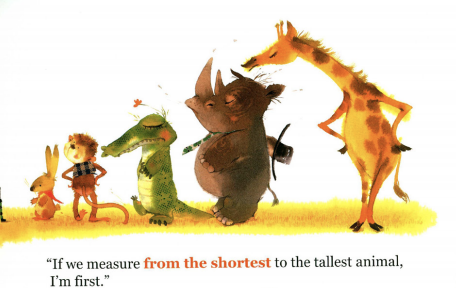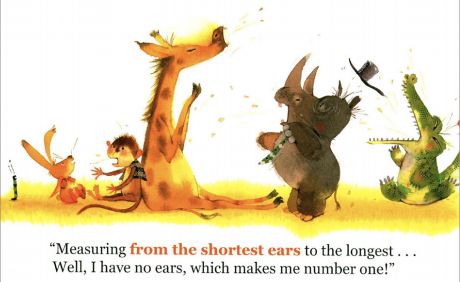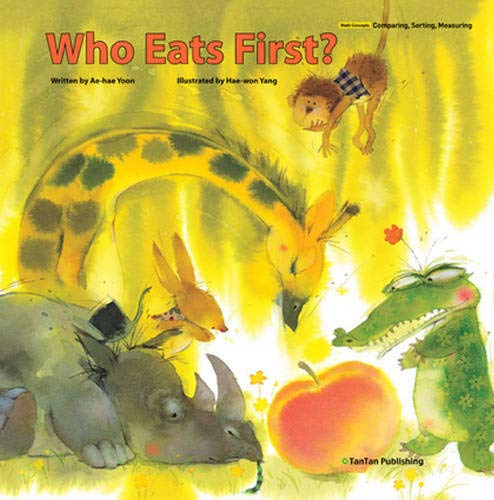¡También se puede aprender matemáticas a la hora del cuento! Intente crear sus propias preguntas.
Activity Summary
Use this storybook guide with the book “Who Eats First.”
Many public libraries have this book.
Reading guide
About the Story
This story is about animals that find a delicious peach but can’t decide who should take the first bite. Each animal makes an argument explaining why they should go first. For example, giraffe thinks he should take the first bite because he’s the tallest, but alligator wants the first bite because his mouth is the biggest.

Words to Learn
MATH WORDS
measure, longer, longest, tallest, shortest, heaviest, lightest, biggest, weight, balanced, tiny, round, first, second
About the Math
Who Eats First is about size and measurement. As the animals discuss their sizes, your child can learn:
- That there are different aspects of animals that can be measured, such as the length of their necks and the width of their mouths.
- The importance of making fair comparisons, such as comparing all the animals’ weights to the same pile of rocks.
- How to use tools to measure: For example, you can measure weight by counting the number of rocks needed to balance the animals on a seesaw.
- That you can line things up in order from shortest to tallest or lightest to heaviest.

Math Talk During Reading
- COMPARE THE SIZES OF THE ANIMALS
Which animal has the smallest mouth? Which animal has the longest ears? - TALK ABOUT OTHER CHARACTERISTICS OF THE ANIMALS THAT CAN BE COMPARED AND MEASURED
Who has the biggest feet? Who has the greatest number of feet? - CONSIDER OTHER WAYS TO MEASURE
How else could we measure the giraffe’s height? How could we find out which animal has the longest tail? - DISCUSS DIFFERENT ANIMALS
Can you think of an animal with shorter ears than a rabbit or a bigger mouth than an alligator? - EXPLORE THE ANIMALS’ MOTIVATION
Why are the animals talking about their sizes? Who do you think should eat the peach first? Why?
Try to come up with some of your own questions and comments, too!
Activity After Reading
- LOOK FOR OBJECTS AROUND YOUR HOME TO COMPARE AND LINE UP IN ORDER.
For example, take uncooked pasta and ask your child to pick out the longest, shortest, or thickest pasta. Line up the pasta from shortest to longest or thickest to thinnest. Also, check out the activities described at the end of the book.
